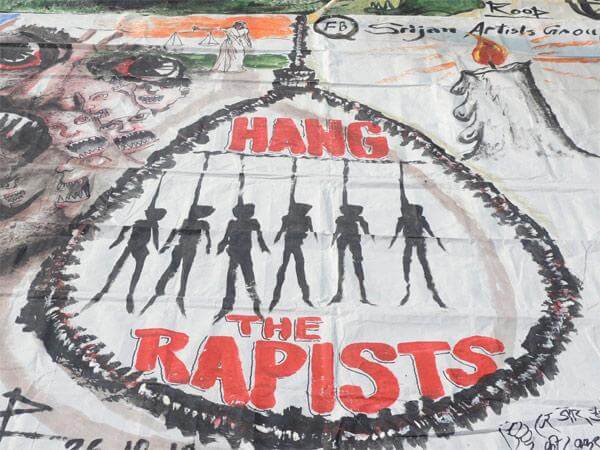The Supreme Court of India has given its verdict and it is that the accused of the 2012 Nirbhaya Rape Case will hang.
Rejecting the request of 3 of the 4 convicted to reduce the death sentence to a life term, the SC has upheld its May 2017 judgment. The trial court and Delhi High Court had both given the accused the capital punishment which was agreed upon by the Supreme Court in 2017.
The refusal comes in light of a review plea filed by 3 of the 4 accused that is Mukesh, 29, Pawan Gupta, 22 and Vinay Sharma, 23. The 4th convict 31-year-old Akshay Kumar Singh had not filed a review petition asking to repeal the earlier judgement.
However, it is said according to sources, that he will be filing for a review petition sometime next week.
A Strong Stand By The SC
The case that has been plaguing the country for almost 6 years now, needs to be finished once and for all.
The brutal and horrifying gangrape inside a running bus of 23 year old medical student, who came to be known as Nirbhaya and died of severe injuries and trauma in Singapore, 16 days after the violence brought a wave of anger and shock across the entire country.
6 men were accused, and of them, one named as Ram Singh allegedly committed suicide while in Tihar Jail and another was a minor who was sent to a juvenile home from which he was recently released after serving a sentence of 3 years.
The Supreme Court, by denying the petition has set a strong stand that justice will not be delayed by unnecessary means of appeals and petitions.
A bench consisting of Chief Justice Dipak Misra and Justices R. Banumathi and Ashok Bhushan delivered the verdict and stated that, “Review applications cannot be entertained.. convict cannot be allowed to re-agitate the grounds of appeal. There has to be an apparent error on record to show it resulted in miscarriage of justice.”
The bench further said that, “The death row convicts failed to point out ‘error’ in the judgement,” and “Convicts were heard elaborately during appeals and no grounds have been made out for review of its verdict.”
The parents of Nirbhaya are happy to hear of the judgement but are anxious for the punishment to be carried out at the earliest so that, not only justice be served, but also an example set for others in the country.

Read More: Nirbhaya: The Girl Who Changed A Nation’s Legislation
Amnesty India Opposing The Verdict
What is a bit shocking to see, however, is Amnesty India, opposing the judgment in this statement given by Asmita Basu, Programmer’s Director at the human rights NGO.
Executions Will Not Eradicate Violence Against Women
In response to the Supreme Court’s verdict on a review plea filed by three of the four convicts today in the 2012 Delhi bus gang-rape and murder case of a young woman, Amnesty International India’s Programmes Director, Asmita Basu said:
“Unfortunately executions do not eradicate violence against women. There is no evidence to show that the death penalty acts as a deterrent for sexual violence or any other crime. Instead, the government must allocate adequate resources for the effective implementation of laws, improve conviction rates and ensure certainty of justice in all cases. Even the Justice Verma Committee, whose recommendations were relied upon to reform laws on sexual assault and rape, had opposed imposing the death penalty in cases of rape.”
In 2017, India was one of only three countries in the world that expanded the scope of the death penalty by adopting new laws. In April 2018, the Central Government approved an ordinance introducing death penalty for those convicted of raping girls aged 12 years or younger.
“All too often lawmakers in India hold up capital punishment as a symbol of their resolve to tackle crime, and choose to ignore more difficult and effective solutions like improving investigations, prosecutions and support for victims’ families. Far-reaching procedural and institutional reforms are the need of the hour.“
Agreed, that the points made about increasing funding and attention to clearing up cases, implementation of laws, and better police structure is needed, but that does not take away the importance of this judgement.
The death penalty is absolutely needed here considering the heinous crimes and the resulting death from it and moreso the human rights of the family of the victim and the victim herself.
To be honest, this statement is an ‘unfortunate step’ since its sad to see a human rights NGO be more concerned for the rights of criminals who have committed such a unimaginably cruel crime rather than be worried about protecting the innocent.
Amnesty India shall lose its respect like this!
Image Credits: Google Images
Sources: Firstpost, NDTV, News18
Other Recommendations:
http://edtimes.in/2017/05/nirbhaya-juvenile-rapist-roaming-free/






























